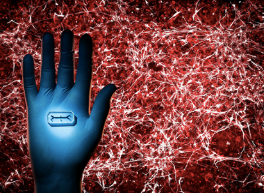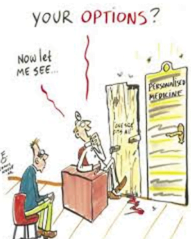Despina Andropoulou – Genomic knowledge vs the desire to know “The futility of filling the holes”

In 2004 Aaron Ciechanover shared the Nobel Prize in Chemistry with Avram Hershko and Irwin Rose ‘for the discovery of ubiquitin-mediated protein degradation’.
 Proteolysis by the ubiquitin-proteasome pathway is recognized by the scientific world as the process that explains numerous normal functions of the nervous system as well as malfunctions of the brain in several neurodegenerative diseases, including schizophrenia and depression.
Proteolysis by the ubiquitin-proteasome pathway is recognized by the scientific world as the process that explains numerous normal functions of the nervous system as well as malfunctions of the brain in several neurodegenerative diseases, including schizophrenia and depression.
When the A. Ciechanover, was asked, “If you had not been a scientist, what do you think you would have done?” He answered: “The natural track would have taken me to cardiac surgery or neurosurgery. There is something mystical about these two organs where emotion and reason reside. But the fact that the discovery of the ubiquitin system led to the unraveling of related diseases and development of drugs is kind of like closing a chapter for me.”
It’s obvious that “the doctor has something no more privileged in the order of the team of savants variously specialized in the different scientific branches”. After the discovery of the molecule that is everywhere (ubiquitus = everywhere), the mysterious union between the symbolic – the emotions – and the body seems to be clarified!
Participation in the treatment: the fantasy in action
 In his Agora Talk at the 68th Lindau Nobel Laureate Meeting, A. Ciechanover focused on The Promises and the Obstacles of Personalized Medicine. The 4P’s revolution of the 21th century – personalized, predictive, preventive and participatory medicine – is based on the idea that genetic testing can reveal a person’s unique risks for various illnesses as well as the most effective treatments. In this way, scientists overcome the two main flaws of the evidence-based medicine: a) the statistical, imprecise approach in the identification of the cause of a disease and b) the unpredictability of the outcome of treatment for each patient.
In his Agora Talk at the 68th Lindau Nobel Laureate Meeting, A. Ciechanover focused on The Promises and the Obstacles of Personalized Medicine. The 4P’s revolution of the 21th century – personalized, predictive, preventive and participatory medicine – is based on the idea that genetic testing can reveal a person’s unique risks for various illnesses as well as the most effective treatments. In this way, scientists overcome the two main flaws of the evidence-based medicine: a) the statistical, imprecise approach in the identification of the cause of a disease and b) the unpredictability of the outcome of treatment for each patient.
On the other hand, A. Ciechanover admitted that the term personalized could be misleading in two ways: “doctors will be less humane, they will be colder, will talk less to the patients, in a more difficult jargon, less understandable...” Moreover, “the diseases will be stratified” and drugs will be manufactured for the most common diseases. “Drugs only for big diseases; it is a matter of market…!”.
 Statistics will still play an essential role in the prediction of the risk of developing certain diseases according to one’s genetic screening. Participation in the treatment will be highly related to the prediction – an oracle that neither reveals nor hides anything – and the prevention of an illness having a certain possibility to appear. Obviously, the patients will respond to the knowledge provided by the genomic screening and the biomarkers, as subjects enjoying their bodies, namely with their fantasy. The decision to remove breasts and ovaries, as Angelina Jolie did, because she carried a gene mutation that could put her at high risk for an aggressive form of cancer, makes us wonder about the consequences of prevention and patients’ participation as parlêtres in the treatment in the years to come.
Statistics will still play an essential role in the prediction of the risk of developing certain diseases according to one’s genetic screening. Participation in the treatment will be highly related to the prediction – an oracle that neither reveals nor hides anything – and the prevention of an illness having a certain possibility to appear. Obviously, the patients will respond to the knowledge provided by the genomic screening and the biomarkers, as subjects enjoying their bodies, namely with their fantasy. The decision to remove breasts and ovaries, as Angelina Jolie did, because she carried a gene mutation that could put her at high risk for an aggressive form of cancer, makes us wonder about the consequences of prevention and patients’ participation as parlêtres in the treatment in the years to come.
Brain teaser for scientists: the desire for jouissance
 The ideal of precise medicine/psychiatry is to motivate healthy lifestyles through genomic knowledge. In his 2015 State of the Union address, President Obama suggested that future advances in biomedicine would provide the “personalized information we need to keep ourselves and our families healthier”, repeating Francis Collins, the director of the National Institutes of Health, for whom personalized medicine “means taking better care of ourselves.”
The ideal of precise medicine/psychiatry is to motivate healthy lifestyles through genomic knowledge. In his 2015 State of the Union address, President Obama suggested that future advances in biomedicine would provide the “personalized information we need to keep ourselves and our families healthier”, repeating Francis Collins, the director of the National Institutes of Health, for whom personalized medicine “means taking better care of ourselves.”
The promise of personalized medicine lies in its ability to inspire behavior change. Nonetheless, researchers from Cambridge University’s Health and Behavior Research Unit analyzed 18 past papers on the link between knowledge of genetic risk and health-behavior change. Their conclusion: “Expectations that communicating DNA-based risk estimates changes behavior are not supported by existing evidence”, confirming that “ there is a desire because there is the unconscious, that is to say, the language that escapes from the subject in its structure and its effects, and that there is always at the level of the language something that is beyond consciousness, and that’s where the function of desire can be situated. That is why it is necessary to bring in this place what [Lacan] called the place of the Other, concerning everything that is about the subject. This is in substance the field in which these excesses of language are identified, the subject of which retains a mark that escapes its own mastery. It’s in this field that the junction with what [Lacan] called the pole of jouissance is created.”
1. Intervention de Jacques Lacan au Congrès de l’Ecole Freudienne de Paris La Grande Motte en 02 novembre 1973. Séance du vendredi 2 novembre (après-midi), parue dans les Lettres de l’École Freudienne, 1975, n° 15, pp. 69-80
2.Ubiquitin and the Brain: Roles of Proteolysis in the Normal and Abnormal Nervous System, Front Mol Neurosci. 2017; 10: 220.Published online 2017 Jul 18. doi: 10.3389/fnmol.2017.00220 A Minelli, C Magri, A Barbon, C Bonvicini, M Segala, C Congiu, S Bignotti, E Milanesi, L Trabucchi, N Cattane, M Bortolomasi & M Gennarelli Proteasome system dysregulation and treatment resistance mechanisms in major depressive disorder, Translational Psychiatry volume 5, page e687 (2015)
Rubio MD1, Wood K, Haroutunian V, Meador-Woodruff JH. Dysfunction of the ubiquitin proteasome and ubiquitin-like systems in schizophrenia. Neuropsychopharmacology. 2013 Sep;38(10):1910-20. doi: 10.1038/npp.2013.84. Epub 2013 Apr 9.
3.Lacan J., La place de la psychanalyse dans la medicine, Conférence et débat du Collège de Médecine à La Salpetrière : Cahiers du Collège de Médecine 1966, pp. 761 à 774
4.https://www.mediatheque.lindau-nobel.org/laureates/ciechanover (2018)
5 .Intervention de Jacques Lacan au CONGRES DE L’ECOLE FREUDIENNE DE PARIS LA GRANDE MOTTE en 02 novembre 1973. Séance du vendredi 2 novembre (après-midi), parue dans les Lettres de l’École Freudienne, 1975, n° 15, pp. 69-80
6.https://obamawhitehouse.archives.gov/precision-medicine
7. Hollands, GJ et al. The impact of communicating genetic risks of disease on risk-reducing health behaviour: systematic review with meta-analysis. BMJ; 15 March 2016; DOI: 10.1136/bmj.i1102
8. Lacan J., La place de la psychanalyse dans la medicine, Conférence et débat du Collège de Médecine à La Salpetrière : Cahiers du Collège de Médecine 1966, pp. 761 à 774

